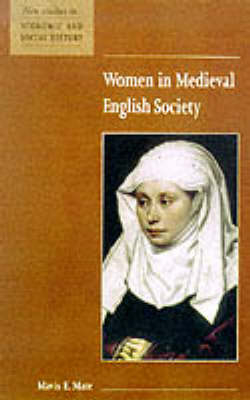
Women in Medieval English Society
Seiten
1999
Cambridge University Press (Verlag)
978-0-521-58733-4 (ISBN)
Cambridge University Press (Verlag)
978-0-521-58733-4 (ISBN)
- Titel z.Zt. nicht lieferbar
- Portofrei ab CHF 40
- Auch auf Rechnung
- Artikel merken
A concise and accessible introduction to the various issues and debates surrounding women and their position in medieval society. Professor Mate examines the role women played in the economy, clarifies the legal provisions for women and highlights the importance of class, as well as gender, in determining marriage and opportunities.
Written primarily for undergraduates, this book weighs the evidence for and against the various theories relating to the position of women at different time periods. Professor Mate examines the major issues deciding the position of women in medieval English society, asking questions such as, did women enjoy a rough equality in the Anglo-Saxon period that they subsequently lost? Did queens at certain periods exercise real political clout or was their power limited to questions of patronage? Did women's participation in the economy grant them considerable independence and allow them to postpone or delay marriage? Professor Mate also demonstrates that class, as well as gender, was very important in determining age at marriage and opportunities for power and influence. Although some women at certain times did make short-term gains, Professor Mate challenges the dominant view that major transformations in women's position occurred in the century after the Black Death.
Written primarily for undergraduates, this book weighs the evidence for and against the various theories relating to the position of women at different time periods. Professor Mate examines the major issues deciding the position of women in medieval English society, asking questions such as, did women enjoy a rough equality in the Anglo-Saxon period that they subsequently lost? Did queens at certain periods exercise real political clout or was their power limited to questions of patronage? Did women's participation in the economy grant them considerable independence and allow them to postpone or delay marriage? Professor Mate also demonstrates that class, as well as gender, was very important in determining age at marriage and opportunities for power and influence. Although some women at certain times did make short-term gains, Professor Mate challenges the dominant view that major transformations in women's position occurred in the century after the Black Death.
1. Introduction; 2. Early medieval society 600–1250; 3. The late Middle Ages 1250–1350; Conclusion.
| Erscheint lt. Verlag | 19.8.1999 |
|---|---|
| Reihe/Serie | New Studies in Economic and Social History |
| Zusatzinfo | Worked examples or Exercises |
| Verlagsort | Cambridge |
| Sprache | englisch |
| Maße | 139 x 216 mm |
| Gewicht | 183 g |
| Themenwelt | Geschichte ► Teilgebiete der Geschichte ► Kulturgeschichte |
| Geschichte ► Teilgebiete der Geschichte ► Sozialgeschichte | |
| Sozialwissenschaften ► Politik / Verwaltung ► Politische Theorie | |
| Sozialwissenschaften ► Soziologie | |
| ISBN-10 | 0-521-58733-6 / 0521587336 |
| ISBN-13 | 978-0-521-58733-4 / 9780521587334 |
| Zustand | Neuware |
| Haben Sie eine Frage zum Produkt? |
Mehr entdecken
aus dem Bereich
aus dem Bereich
der stille Abschied vom bäuerlichen Leben in Deutschland
Buch | Hardcover (2023)
C.H.Beck (Verlag)
CHF 32,15
vom Mittelalter bis zur Gegenwart
Buch | Softcover (2024)
C.H.Beck (Verlag)
CHF 16,80
Die Revolution des Gemeinen Mannes
Buch | Softcover (2024)
C.H.Beck (Verlag)
CHF 16,80


